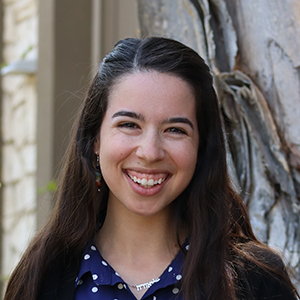Laurel Benjamin, B.S.

Pronouns: she, her
Doctoral Student Therapist
SDSU Psychology Clinic
SDSU
Primary Email: [email protected]
Phone/Fax
Primary Phone: 619-594-0131 (ext. 12)
Building/Location
6363 Alvarado Court
Suite 102
San Diego,
CA
92120
Bio
My research centers on the implementation and dissemination of evidence-based practices (EBPs) within systems of care that serve children with mental health (MH) needs. I study strategies to encourage MH providers to adopt EBPs for their autistic clients. I am dedicated to addressing service disparities among neurodiverse populations using a combination of community-partnered and mixed-methods research approaches. Through my research, I strive to support culturally diverse and neurodiverse populations, with a particular focus on Spanish-speaking families.
Education
- B.S. in Psychology and Spanish
Haverford College
Areas of Specialization
Implementation Science, Children’s Mental Health, Autism, Families, Culture, Service Disparities
Awards & Honors
- 2023-2024: SDSU University Graduate Fellowship, San Diego State University
- 2024-2027: NSF Graduate Research Fellowship, National Science Foundation
Publications
- Neece, C. L., Fenning, R. M., Morrell, H., & Benjamin, L. R. (2023). Comparative effects of mindfulness-based stress reduction and psychoeducational support on parenting stress in families of autistic preschoolers. Autism. https://doi.org/10.1177/13623613231191558
- Sanner, C., Benjamin, L. R., Eskander, C., McGregor, H., Preston, A., McIntyre, L. L., & Neece, C. L. (2023). Sibling support and perceived daily hassles in Latino and non-Latino families of children with DD. The Family Journal. 31(2), 330-340. https://doi.org/10.1177/10664807221151174
- Benjamin, L. R., & Wang, S. W. (2022). One size doesn’t fit all: Forms of social technology differentially predict distress. Communication Research Reports, 39(2), 80-92. https://doi.org/10.1080/08824096.2022.2037542
- Benjamin, L., Ni, X., & Wang, S. W. (2021). Implicit support differs across five groups in the U.S., Taiwan, and Mexico. Cultural Diversity and Ethnic Minority Psychology, 27(4), 675-683. https://doi.org/10.1037/cdp0000471
